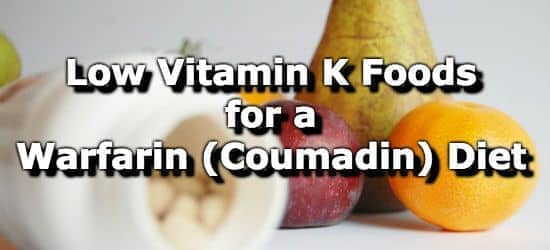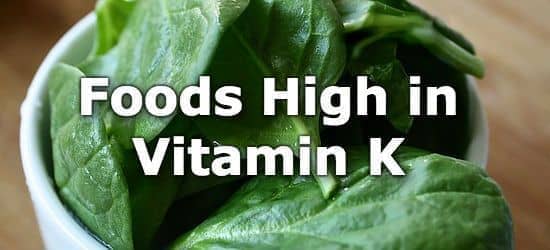Foods Low in Vitamin K for a Warfarin (Coumadin) Diet

If you are taking an anticoagulant or a blood thinner, like Warfarin (Coumadin), then it is important to keep your PT/INR (Prothrombin Time and International Normalized Ratio) levels stable. PT/INR measures factors for blood coagulation.
The amount of vitamin K you can eat while taking warfarin depends on your dose. Studies suggest that effects on coagulation only occur after eating 150mcg (micrograms) of vitamin K. (1) What is important is that your intake of vitamin K stays consistent. (1,2) Having a cheat day where you eat a large amount of vitamin K, like a spinach salad, could be harmful.
High amounts of vitamin K are mainly found in green vegetables like kale, spinach, cucumbers, and cabbage.
This is a guide to which foods you can eat and in what amounts. The exact amounts will depend on your dosage of Warfarin. Listed below are foods very high in vitamin K (240mcg+ per serving), and high in vitamin K (60mcg+ per serving).
The current daily value (DV) for Vitamin K is 120 micrograms (mcg). (3) It is displayed in this article to help you compare levels of vitamin K in foods. Depending on your doctor and situation 120mcg for men and 90mcg for women may be a generally accepted target for Vitamin K while one Warfarin.
Foods low in vitamin K are also presented by food group with sample serving sizes and amounts of vitamin K. For more ideas, use the nutrient ranking tool to sort by food group and serving size.
- Introduction
- Guidelines When Taking Warfarin
- List of Common Foods with more than 240mcg (200% DV) of Vitamin K
- List of Common Foods with more than 60mcg (50% DV) of Vitamin K
- Foods Low in Vitamin K to eat on a Warfarin (Coumadin) Diet
- Vegetables Low in Vitamin K
- Fruits Low in Vitamin K
- Grains (Starches) Low in Vitamin K
- Other Food Groups Low in Vitamin K
- Juice Recipes Low in Vitamin K
- Warnings
- Lists By Food Group
- References
General guidelines when taking Warfarin (Coumadin)
- A low INR means you have an increased risk of clotting
- A high INR means you have an increased risk of bleeding
- Warfarin increases INR, Vitamin K decreases it
- Most doctors aim to keep INR around 2-3, but it can go up to 2.5-3.5 for people with heart valve issues or other extreme cases (4)
- When a doctor prescribes Warfarin, they are trying to balance it with how much vitamin K you eat (2)
- Regularly check your PT/INR levels
- Take Warfarin as directed by your care provider
- Keep your intake of vitamin K consistent from day to day
- Eliminate alcohol if you can, or limit yourself to no more than 3 drinks a day (5)
- Take no more than 800IU of vitamin E supplements
- Avoid cranberries and cranberry juice as they can raise INR and risk of bleeding (6)
- Limit or avoid grapefruit and grapefruit juice
- Avoid drinking green tea as it antagonizes Warfarin and lowers INR (7)
- Work with your doctor when taking CoQ10 as it can hamper the effectiveness of Warfarin (8)
- Avoid Tobacco (9)
- Many natural herbs, roots, berries, and supplements affect PT/INR levels, so it is best to avoid them unless your doctor advises otherwise. The following supplements definitely affect PT/INR levels: (9)
- Arnica
- Bilberry
- Butcher's Broom
- Cat's Claw
- Chamomile Tea
- Chitosan
- Dong Quai
- Feverfew
- Forskolin
- Garlic
- Ginger
- Gingko
- Goji Berries
- Horse Chestnut
- Insositol Hexaphosphate
- Licorice
- Melilot (Sweet Clover)
- Pau D'arco
- Red Clover
- St. John's Wort
- Sweet Woodruff
- Turmeric
- Willow Bark
- Wheat Grass
- Wolfberry
List of Common Foods with more than 240mcg (200% DV) of Vitamin K
| Food | Serving | Vitamin K |
|---|---|---|
| 1. Parsley (Fresh / Raw) + | per cup chopped | 820% DV (984mcg) |
| 2. Cooked Spinach + | per cup | 740% DV (888mcg) |
| 3. Cooked Mustard Greens + | per cup | 691% DV (830mcg) |
| 4. Cooked Collards + | per cup | 644% DV (773mcg) |
| 5. Cooked Beet Greens + | per cup | 581% DV (697mcg) |
| 6. Cooked Dandelion Greens + | per cup | 482% DV (579mcg) |
| 7. Cooked Swiss Chard + | per cup | 477% DV (573mcg) |
| 8. Cooked Turnip Greens + | per cup | 441% DV (529mcg) |
| 9. Garden Cress (Fresh / Raw) + | per cup chopped | 226% DV (271mcg) |
List of Common Foods with more than 60mcg (50% DV) of Vitamin K
| Food | Serving | Vitamin K |
|---|---|---|
| 1. Cooked Broccoli + | per cup chopped | 183% DV (220mcg) |
| 2. Cooked Brussels Sprouts + | per cup | 182% DV (219mcg) |
| 3. Cooked Cabbage + | per cup | 136% DV (163mcg) |
| 4. Raw Spinach + | per cup | 121% DV (145mcg) |
| 5. Raw Radicchio + | per cup shredded | 85% DV (102mcg) |
| 6. Cooked Asparagus + | per cup cooked | 76% DV (91mcg) |
| 7. Cooked Chinese Broccoli (Gai Lan) + | per cup | 62% DV (75mcg) |
| 8. Kiwifruit + | per cup sliced | 60% DV (73mcg) |
| 9. Cooked Soybean Sprouts + | per cup | 55% DV (66mcg) |
| 10. Kimchi + | per cup | 55% DV (65mcg) |
| 11. Cooked Okra + | per cup sliced | 53% DV (64mcg) |
| 12. Raw Kale + | per cup chopped | 52% DV (62mcg) |
| 13. Cooked Green Beans + | per cup | 50% DV (60mcg) |
Foods Low in Vitamin K to eat on a Warfarin (Coumadin) Diet
Vegetables Low in Vitamin K
| Food | Serving | Vitamin K |
|---|---|---|
| 1. Cooked Snow Peas + | per cup | 33% DV (40mcg) |
| 2. Arugula + | per cup | 18% DV (22mcg) |
| 3. Cooked Carrots + | per cup sliced | 18% DV (21mcg) |
| 4. Raw Celery + | per stalk | 16% DV (19mcg) |
| 5. Cooked Green Bell Peppers + | per cup | 11% DV (13mcg) |
| 6. Cilantro + | per 1/4 cup | 10% DV (12mcg) |
| 7. Raw Alfalfa Sprouts + | per cup | 8% DV (10mcg) |
| 8. Cooked Zucchini + | per cup sliced | 6% DV (8mcg) |
| 9. Raw Red Bell Peppers + | per cup chopped | 6% DV (7mcg) |
| 10. Cooked Tomatoes + | per cup | 6% DV (7mcg) |
| 11. Cooked Bitter Melon + | per cup | 5% DV (6mcg) |
| 12. Baked Potatoes + | per medium potato | 4% DV (5mcg) |
| 13. Baked Sweet Potatoes + | per cup | 4% DV (5mcg) |
| 14. Cooked Eggplant + | per cup cubed | 2% DV (3mcg) |
| 15. Cooked Pumpkin + | per cup mashed | 2% DV (2mcg) |
| 16. Winter Squash + | per cup cubed | 1% DV (1mcg) |
| 17. Sweet Corn + | per cup | 0% DV (0mcg) |
| 18. Cooked Beets + | per cup | 0% DV (0mcg) |
| 19. Raw Turnips + | per cup cubed | 0% DV (0mcg) |
| 20. Mushrooms + | per cup pieces | 0% DV (0mcg) |
Fruits Low in Vitamin K
| Food | Serving | Vitamin K |
|---|---|---|
| 1. Grapes + | per cup | 11% DV (13mcg) |
| 2. Plums + | per cup | 9% DV (11mcg) |
| 3. Pears + | per cup sliced | 5% DV (6mcg) |
| 4. Asian Pears + | per fruit | 5% DV (5mcg) |
| 5. Apricots + | per cup halves | 4% DV (5mcg) |
| 6. Cantaloupe + | per cup pieces | 4% DV (4mcg) |
| 7. Fuyu Persimmons + | per fruit | 4% DV (4mcg) |
| 8. Guavas + | per cup pieces | 4% DV (4mcg) |
| 9. Peaches + | per cup sliced | 3% DV (4mcg) |
| 10. Papaya + | per cup pieces | 3% DV (4mcg) |
| 11. Strawberries + | per cup sliced | 3% DV (4mcg) |
| 12. Cherries + | per cup pitted | 3% DV (3mcg) |
| 13. Nectarines + | per cup sliced | 3% DV (3mcg) |
| 14. Figs + | per large fig | 3% DV (3mcg) |
| 15. Apples + | per cup quartered | 2% DV (3mcg) |
| 16. Pineapple + | per cup pieces | 1% DV (1mcg) |
| 17. Litchis + | per cup | 1% DV (1mcg) |
| 18. Bananas + | per cup sliced | 1% DV (1mcg) |
| 19. Dates + | per 3 dates | 0% DV (1mcg) |
| 20. Watermelon + | per cup pieces | 0% DV (0mcg) |
Grains (Starches) Low in Vitamin K
| Food | Serving | Vitamin K |
|---|---|---|
| 1. Buckwheat (Groats) + | per cup | 3% DV (3mcg) |
| 2. Whole Wheat Bread + | per 1oz slice | 2% DV (2mcg) |
| 3. Cooked Pearled Barley + | per cup | 1% DV (1mcg) |
| 4. Bulgur + | per cup | 1% DV (1mcg) |
| 5. Wild Rice + | per cup | 1% DV (1mcg) |
| 6. Oatmeal + | per cup | 1% DV (1mcg) |
| 7. Whole Wheat Pasta + | per cup | 1% DV (1mcg) |
| 8. Millet + | per cup | 0% DV (1mcg) |
| 9. Brown Rice + | per cup | 0% DV (0mcg) |
| 10. Couscous + | per cup | 0% DV (0mcg) |
| 11. White Bread + | per 1oz slice | 0% DV (0mcg) |
| 17. Pasta + | per cup | 0% DV (0mcg) |
| 18. Quinoa + | per cup | 0% DV (0mcg) |
| 19. White Rice + | per cup | 0% DV (0mcg) |
| 20. Yellow Cornmeal (Grits) + | per cup | 0% DV (0mcg) |
Other Food Groups Low in Vitamin K
All meats and fish are low in vitamin K with the exception of some canned fish packed in oil, and abalone.
All dairy and egg products are low in Vitamin K.
Except for fava beans, black-eyed peas, soybeans, natto, some soy products, and green beans, all beans and legumes are low in vitamin K.
If you are into juicing, here are some low vitamin K juice recipes.
Juice Recipes Low in Vitamin K
| Ingredients | Weight | Vitamin K | Calories |
| 1 Medium Apple (Without Skin) | 161g | 1mcg (1% DV) | 77 |
| 1 Medium Banana | 150g | 0.8mcg (1% DV) | 134 |
| 1 Cup Whole Strawberries | 144g | 3.2mcg (3% DV) | 46 |
| Total | 455g | 4.9 (4% DV) | 257 |
| Edit in the Recipe Nutrition Calculator | |||
(Add water or ice as needed)
| Ingredients | Weight | Vitamin K | Calories |
| 2 Cups Diced Watermelon | 304g | 0.3mcg (0% DV) | 91 |
| View Complete Nutrition Facts for Watermelon | |||
(Add water or ice as needed)
| Ingredients | Weight | Vitamin K | Calories |
| 1 Cup Diced Watermelon | 152g | 0.2mcg (0% DV) | 46 |
| 1 Cup Whole Strawberries | 144g | 3.2mcg (3% DV) | 46 |
| Total | 296g | 3.3 (3% DV) | 92 |
| Edit in the Recipe Nutrition Calculator | |||
| Ingredients | Weight | Vitamin K | Calories |
| 2 Cups Litchis (Peeled) | 380g | 1.5mcg (1% DV) | 251 |
| View Complete Nutrition Facts for Litchis | |||
| Ingredients | Weight | Vitamin K | Calories |
| 1 Cup Diced Watermelon | 152g | 0.2mcg (0% DV) | 46 |
| 1 Cup Raspberries | 123g | 9.6mcg (8% DV) | 64 |
| 1 Medium Apple (Without Skin) | 161g | 1mcg (1% DV) | 77 |
| Total | 436g | 10.7 (9% DV) | 187 |
| Edit in the Recipe Nutrition Calculator | |||
Warnings
- Avoid making any big changes to your diet. If you try any new food, try it in small quantities and monitor your PT/INR
- Even though a food is low in vitamin K it does not mean that it will not interact with Warfarin (Coumadin). This article is intended as a general guide for foods low in vitamin K and is for information purposes only. As stated above, try new foods with caution and consult health care providers or literature before trying new foods.
From the Nutrient Ranking Tool
Use the ranking tool links below to select foods and create your own food list to share or print.
- Foods High in Vitamin K
- Foods Low in Vitamin K
- Vegetables High in Vitamin K
- Fruits High in Vitamin K
- Vegetarian Foods High in Vitamin K
- Beans High in Vitamin K
- Dairy High in Vitamin K
- Breakfast Cereals High in Vitamin K
- Fast Foods High in Vitamin K
View more nutrients with the nutrient ranking tool, or see ratios with the nutrient ratio tool.
Related
Data Sources and References
- Couris R, Tataronis G, McCloskey W, Oertel L, Dallal G, Dwyer J, Blumberg JB. Interaction Between Dietary Vitamin K Intake and Anticoagulation by Vitamin K Antagonists: Is It Really True?: A Systematic Review Int J Vitam Nutr Res. 2006 Mar;76(2):65-74. doi: 10.1024/0300-9831.76.2.65. 16941417
- Olsson SB, Halperin JL. Dietary implications for patients receiving long-term oral anticoagulation therapy for treatment and prevention of thromboembolic disease Semin Vasc Med. 2005 Aug;5(3):285-92. doi: 10.1055/s-2005-916168. 16123916
- U.S.FDA - Daily Value on the New Nutrition and Supplement Facts Labels
- Agarwal S, Bennett D, Smith DJ. Consensus guidelines for warfarin therapy. Recommendations from the Australasian Society of Thrombosis and Haemostasis Am J Cardiovasc Drugs. 2010;10(1):37-48. doi: 10.2165/11318870-000000000-00000. 20104933
- Parrish RH, Pazdur DE, O'donnell PJ. Enhanced antithrombotic effect of warfarin associated with low-dose alcohol consumption Pharmacotherapy. 2006 Nov;26(11):1650-3. doi: 10.1592/phco.26.11.1650. 17064211
- Paeng CH, Sprague M, Jackevicius CA. Warfarin-cranberry juice interaction resulting in profound hypoprothrombinemia and bleeding Clin Ther. 2007 Aug;29(8):1730-5. doi: 10.1016/j.clinthera.2007.08.018. 17919554
- Hidalgo K, Lyles A, Dean SR. Probable antagonism of warfarin by green tea Ann Pharmacother. 2011 Jan;45(1):e3. doi: 10.1345/aph.1P491. Epub 2010 Dec 28. 21189363
- Goll J. [Interaction between warfarin and coenzyme Q10] Ugeskr Laeger. 1998 Aug 17;160(34):4916. 9741268
- Asher GN, Corbett AH, Hawke RL. Warfarin and food, herbal or dietary supplement interactions: A systematic review Am Fam Physician. 2017 Jul 15;96(2):101-107. 28762712
- ODS Fact Sheet on Coumadin (Legacy file hosted on MyFoodData.com)
Simplify Nutrition Tracking with MyFoodData!
Speedy Tools and Detailed Data FREEEasily analyze your meals to find the best foods for your goals.
✅ Use our recipe nutrition calculator and nutrition comparison tool.
✅ Access expert nutrition data tools and in-depth articles.
✅ Log foods and organize your recipes with a free account.


 Next ➞
Next ➞
